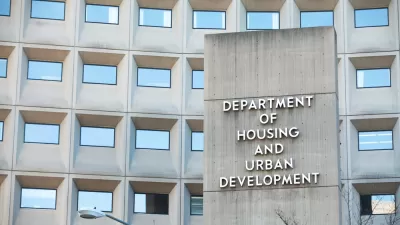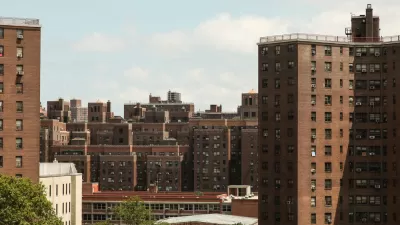More details of the Trump Administration's agenda at the Department of Housing and Urban Development were revealed late last week.

"The Trump administration may introduce minimum work requirements for some recipients of housing aid, while raising rents for others," reports Kriston Capps on a developing story that reveals details of the ongoing evolution of federal housing policy under the Trump Administration.
Capps describes the document as a draft proposal for rent reforms, with input from the U.S. Department of Housing and Urban Development (HUD). "The document sets forth line-by-line text changes to the U.S. Housing Act of 1937, the law that first established federal housing aid, plus adjustments to subsequent acts in 1959 and 1990," explains Capps. Any action to establish work requirements for housing aid would be in line with similar policies enacted for food aid and Medicaid in recent months. Capps describes the HUD action as another sign that the Trump Administration is cutting the social safety net.
Capps's coverage of the document includes a lot more detail about the proposed changes to the U.S. Housing Act, the politics of housing assistance, and the potential effects of these changes for people seeking or receiving housing assistance.
A separate article by Rachel M. Chohen and Zaid Jilani also details the leaked document, describing it as draft legislation and including a quote from HUD Spokesperson Brian Sullivan, who tells the reporters that more details about work requirements and rent increases will be available when the Trump Administration announces its budget later this month. Cohen and Jilani also report that the draft legislation proposes rent hikes for people receiving housing assistance. According to their analysis, households receiving federal housing subsidies would lose elderly and disabled deductions, a child care deduction, and medical and disability deductions.

Alabama: Trump Terminates Settlements for Black Communities Harmed By Raw Sewage
Trump deemed the landmark civil rights agreement “illegal DEI and environmental justice policy.”

Planetizen Federal Action Tracker
A weekly monitor of how Trump’s orders and actions are impacting planners and planning in America.

Why Should We Subsidize Public Transportation?
Many public transit agencies face financial stress due to rising costs, declining fare revenue, and declining subsidies. Transit advocates must provide a strong business case for increasing public transit funding.

Understanding Road Diets
An explainer from Momentum highlights the advantages of reducing vehicle lanes in favor of more bike, transit, and pedestrian infrastructure.

New California Law Regulates Warehouse Pollution
A new law tightens building and emissions regulations for large distribution warehouses to mitigate air pollution and traffic in surrounding communities.

Phoenix Announces Opening Date for Light Rail Extension
The South Central extension will connect South Phoenix to downtown and other major hubs starting on June 7.
Urban Design for Planners 1: Software Tools
This six-course series explores essential urban design concepts using open source software and equips planners with the tools they need to participate fully in the urban design process.
Planning for Universal Design
Learn the tools for implementing Universal Design in planning regulations.
Caltrans
Smith Gee Studio
Institute for Housing and Urban Development Studies (IHS)
City of Grandview
Harvard GSD Executive Education
Toledo-Lucas County Plan Commissions
Salt Lake City
NYU Wagner Graduate School of Public Service




























